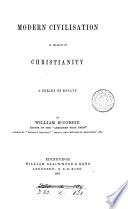 | William Edward Hartpole Lecky - Ethics - 1809 - 532 pages
...reference to man. ' The creed which accepts as the foundation of morals, utility or the greatest happiness principle, holds that actions are right in proportion...as they tend to produce the reverse of happiness.' — Utilitafianism, pp. 0-10. * The exception of course being domestic animals, which may be injured... | |
 | American literature - 1871 - 808 pages
...utilitarian school, on the contrary, have maintained that we have no proof of such an intuitional sense ; that actions are right in proportion as they tend...as they tend to produce the reverse of happiness. But since they have never assigned any other reason for the desire to produce general happiness than... | |
 | Great Britain - 1863 - 972 pages
...ri:.. — "The creed which accepts as the foundation of morals, utilitv. or the greatest happiness principle; holds that actions are right in proportion...is intended pleasure, and the absence of pain ; by unhappiuess, pain, and the privation of pleasure " (p. 10). "According to the greatest happiness principle,... | |
 | John Stuart Mill - Decision making - 1863 - 120 pages
...degradation.* The creed which accepts as the foundation of morals, Utility, or the Greatest Happiness Principle, holds that actions are right in proportion...promote happiness, wrong as they tend to produce the * The author of this essay has reason for believing himself to be the first person who brought the... | |
 | John Stuart Mill - Utilitarianism - 1864 - 108 pages
...well feel themselves called upon to resume it, if by doing so they can hope to contribute anything towards rescuing it from this utter degradation.*...promote happiness, wrong as they tend to produce the * The author of this essay has reason for believing himself to be the first person who brought the... | |
 | Charles Tennant - 1864 - 502 pages
...Utility is, or what Mr. Mill means by it. The only explanation which he has given is that, " Utility holds that actions are right in proportion as they...as they tend to produce the reverse of happiness." There is nothing new in this, and nobody ever disputed it, but there is not much explanation in this.... | |
 | William McCombie - Christianity and culture - 1864 - 178 pages
...others." " The creed which accepts as the foundation of morals, Utility, or the Greatest Happiness Principle, holds that actions are right in proportion as they tend to promote happiness, wrong in proportion as they tend to produce the reverse of happiness. By happiness is intended pleasure,... | |
 | Charles Tennant - Utilitarianism - 1864 - 486 pages
...explanation which he has given is that, " Utility holds that actions are right in proportion as they tend te promote happiness, wrong as they tend to produce the reverse of happiness." There is nothing newjn this, and nobody ever dispute3Tt7^ut there is not much explanation in this.... | |
 | Jared Sparks, Edward Everett, James Russell Lowell, Henry Cabot Lodge - American fiction - 1865 - 666 pages
...defined as meaning " tendency to happiness," is the standard of morality. " By happiness," he says, " is intended pleasure and the absence of pain ; by unhappiness, pain and the privation of pleasure." " Pleasure and the freedom from pain are the only things desirable as ends, and all desirable things... | |
 | Congregationalism - 1866 - 648 pages
...utilitarian theon-. " The creed which accepts as the foundation of morals, utility, or the greatest happiness principle, holds that actions are right in proportion...as they tend to produce the reverse of happiness." l He makes right and wrong '' questions of observation and experience." He denies that there are innate... | |
| |